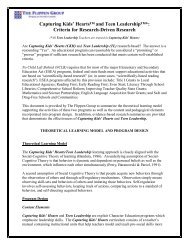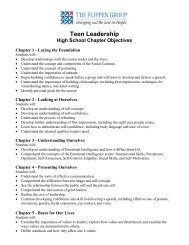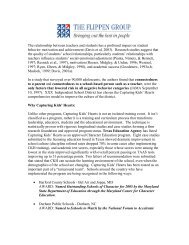Smart & Good High Schools - The Flippen Group
Smart & Good High Schools - The Flippen Group
Smart & Good High Schools - The Flippen Group
- No tags were found...
You also want an ePaper? Increase the reach of your titles
YUMPU automatically turns print PDFs into web optimized ePapers that Google loves.
CHAPTER 1: <strong>The</strong> Call to CharacterBecause honesty is a value slowly being lost in society,schools need to teach it, encourage it, lead by example,praise it, and apply greater punishments than they now doto those who cheat. Don’t let anything slide by.This student’s wisdom is echoed by the conclusion of <strong>The</strong>Cheating Culture: “If the next generations of Americans areto help build a more ethical society and sustain it, they mustcome of age within institutions that are far less tolerant ofcheating than today’s high schools and universities.” 40“If the next generations of Americansare to build a more ethical society, theymust come of age within institutionsthat are far less tolerant of cheating.”A Second Moral Challenge:Teens are growing up in amedia-driven popular culturewhose values are largelyantithetical to intellectual andmoral excellence.Throughout history, three great social institutions—family,school, and religion—have shaped the conscience andcharacter of the next generation. <strong>The</strong> twentieth centurysaw the rise of a powerful fourth force as an influence onyouth values: the electronic media. A challenge thatschools are only beginning to come to grips with is thattoday’s young people are growing up immersed fromtheir earliest years in a media-saturated environment, onethat is, in many respects, subversive of both intellectualand moral development. A number of students on ourStudent Leaders Panel spoke about what they saw as themedia’s negative impact on adolescents’ confidence andidentity development. One girl said:<strong>The</strong> media culture has turned us into trend-followers andnot trend-setters. <strong>The</strong> media bombard teenagers with imagesof how they should dress, how they should act, and howthey should feel. In many cases, when teenagers deviatefrom these images, they find themselves questioning theiridentity and self-worth. It’s very rare to find teens who arecomfortable with who they are.Another girl commented:For girls, there is tremendous pressure to look “beautiful.”From advertising we have this notion of beauty that is notbeauty at all. Many teens are depressed because they don’tlike how they look. Drugs, drinking, eating disorders, selfcutting,and sexual promiscuity are some of the ways wedeal with that.<strong>The</strong> late Neil Postman, author of such books as <strong>The</strong> Disappearanceof Childhood and Amusing Ourselves to Death,observed that because of television, 5-year-olds now knowthings that only adults used to know. Sadly, TV has donethis with the permission of parents. Historically, parentshad exercised supervisory authority over what their kidswere exposed to, but now, in at least half of homes, parentsplace no regulations on the television children watch. 41According to Kids and the Media at the New Millennium, aKaiser Family Foundation study, two-thirds of Americanchildren between 8 and 13 have their own TVs in theirbedrooms. So do one-third of all children ages 2 to 7.Counting all forms of electronic media, youth between 8and 18 consume, on average, 6 hours and 43 minutes ofelectronic media a day—or 45 hours a week.<strong>The</strong> average young person between 8and 18 consumes nearly seven hoursof electronic media a day.“<strong>The</strong>re are dozens of well-designed studies,” says one leadingresearcher, “that show that TV, movies, and othermedia affect what viewers believe and how they behave.” 42Overall, according to a 2003 Born to Be Wired report, televisionviewing among 13 to 24-year-olds drops to an averageof 14 hours a week while Internet surfing rises to 17 hoursa week. 43 (Pornography and hate sites featured on theInternet obviously present their own moral challenges.)This is no time for principals and teachers tostand timidly aside, sounding either anuncertain trumpet or no trumpet at all. <strong>The</strong>makers of music videos and porn films, theeditors of teen magazines, and the rock andrap idols are sounding no uncertain trumpetin advancing their agendas . . . Those of uswho believe that life has meaning and purpose—thathonesty, simplicity, respect, andconcern for others are eternal and lifeenhancingvalues—cannot in good conscienceremain silent.—F. WASHINGTON JARVIS11<strong>Smart</strong> & <strong>Good</strong> <strong>High</strong> <strong>Schools</strong>















